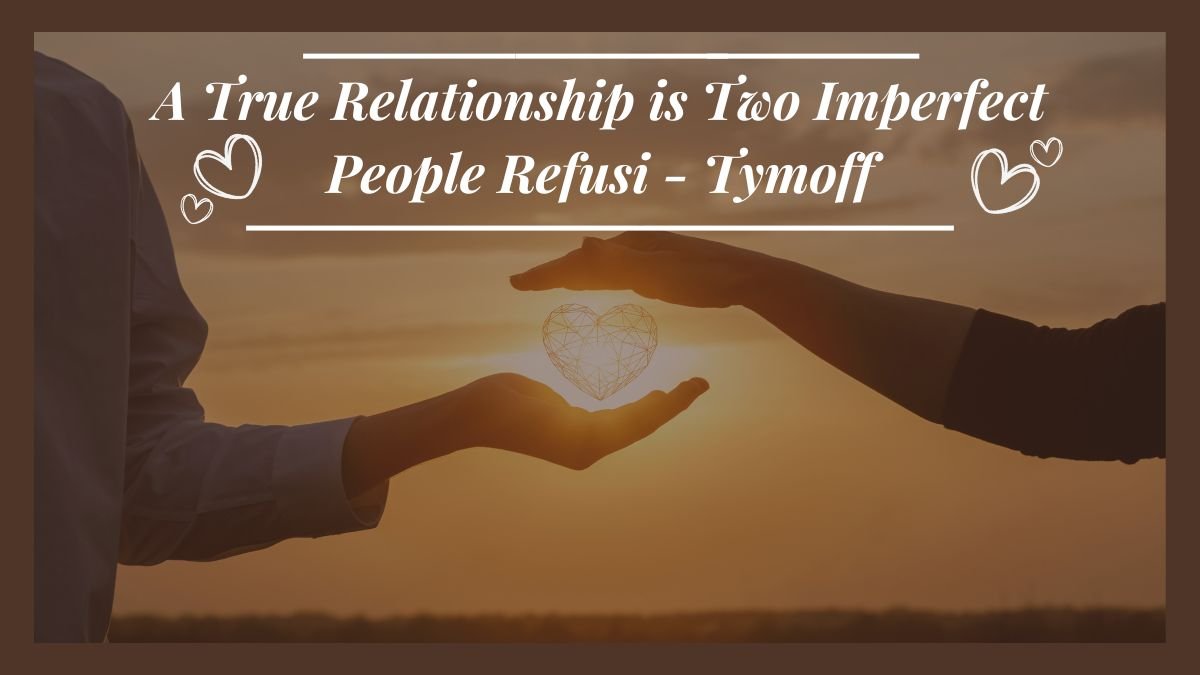Relationships are a fundamental part of human existence, offering companionship, support, and love. At the heart of every enduring relationship is the quote by Tymoff, “A True Relationship is Two Imperfect People Refusi – Tymoff.” This simple yet profound statement encapsulates the essence of what makes relationships last despite the inevitable challenges. Understanding and embracing imperfections is crucial in fostering a bond that can withstand the test of time.
Understanding Imperfections in Relationships
Imperfections are inherent to human nature. No one is flawless; everyone has quirks, shortcomings, and areas for improvement. Being imperfect means having strengths and weaknesses, making mistakes, and learning along the way.
Common Imperfections in Individuals
Some common imperfections include impatience, insecurity, stubbornness, and forgetfulness. These traits can lead to misunderstandings and conflicts in relationships, but they also offer opportunities for growth and deeper connection.
How Imperfections Manifest in Relationships
In relationships, imperfections might appear as disagreements, miscommunications, or unmet expectations. These moments can strain the bond but also serve as a foundation for strengthening it through understanding and compromise.
Read Also: Get_Ready_Bell:Client_Pulse | Timewarp Taskus
The Role of Acceptance in Relationships
Acceptance is about acknowledging your partner’s flaws without trying to change them. It involves loving them for who they are, imperfections and all.
The Power of Unconditional Love
Unconditional love means loving your partner regardless of their faults. It’s a powerful force that fosters trust, security, and a deeper emotional connection.
Building Trust Through Acceptance
When partners accept each other fully, it builds trust. Knowing that you are loved despite your imperfections creates a safe space for both individuals to be their authentic selves.
Communication: The Lifeline of Relationships
Open communication is crucial in any relationship. It ensures that both partners feel heard, understood, and valued.
Strategies for Effective Communication
Effective communication involves active listening, expressing oneself clearly, and being open to feedback. It also means addressing issues promptly rather than letting them fester.
Handling Misunderstandings and Conflicts
Misunderstandings are inevitable, but they can be resolved through calm discussions and mutual respect. It’s important to approach conflicts with a solution-oriented mindset.
Commitment: The Glue that Binds
Commitment means being dedicated to your partner and the relationship. It’s a promise to work through difficulties and stay together through thick and thin.
Ways to Demonstrate Commitment
You can show commitment by being reliable, making sacrifices, and prioritizing your relationship. Small acts of kindness and consistent effort go a long way.
Overcoming Challenges Together
Challenges are a part of life, and facing them together strengthens the bond. Supporting each other during tough times builds resilience in the relationship.
The Art of Compromise
Compromise is about finding a middle ground where both partners feel satisfied. It’s a vital skill for resolving differences and maintaining harmony.
Finding a Balance
Balancing individual needs with those of the relationship requires empathy and flexibility. It’s about giving and taking in equal measure.
Examples of Healthy Compromises
Examples of healthy compromises include alternating choice of activities, splitting household chores, and respecting each other’s personal space.
Read Also: PNP Coda
Emotional Support and Empathy: A True Relationship is Two Imperfect People Refusi – Tymoff
Being there for your partner emotionally means offering a listening ear, showing empathy, and providing reassurance during difficult times.
Practicing Empathy
Empathy involves understanding and sharing your partner’s feelings. It’s about putting yourself in their shoes and responding with compassion.
The Impact of Emotional Support on Relationship Longevity
Emotional support strengthens the emotional bond and contributes to the overall health and longevity of the relationship.
Growth and Adaptation
Growth in a relationship means evolving together. It involves learning from each other and facing new experiences as a team.
Adapting to Changes
Adaptability is key in a relationship. Life is full of changes, and being able to adjust to new circumstances together is essential.
Supporting Each Other’s Personal Growth
Encouraging and supporting each other’s personal goals and aspirations fosters mutual respect and deepens the connection.
Shared Goals and Values
Shared goals provide a sense of direction and purpose in a relationship. They align your efforts and create a unified vision for the future.
Aligning Values and Beliefs
Having similar values and beliefs strengthens the bond. It ensures that both partners are on the same page regarding important aspects of life.
Working Towards Common Objectives
Working towards common objectives, such as financial stability or starting a family, fosters teamwork and strengthens the relationship.
Dealing with External Pressures
External pressures, such as work stress or family expectations, can strain a relationship. It’s important to address these pressures together.
Strategies to Handle External Influences
Handling external influences involves setting boundaries, communicating openly, and supporting each other in dealing with outside stressors.
Maintaining a United Front
Presenting a united front helps in navigating external challenges. It shows that you are a team and reinforces the bond.
Intimacy and Connection
Physical Intimacy
Physical intimacy is an important aspect of a relationship. It includes affection, closeness, and sexual connection.
Emotional Intimacy
Emotional intimacy involves sharing your thoughts, feelings, and experiences with each other. It’s about being vulnerable and open.
Building a Deep Connection
Building a deep connection requires time, effort, and mutual respect. It’s about nurturing the emotional and physical aspects of the relationship.
Forgiveness and Letting Go
Forgiveness is crucial for moving past mistakes and maintaining a healthy relationship. It allows you to let go of grudges and focus on the present.
How to Forgive and Move On
Forgiving involves acknowledging the hurt, understanding the reasons behind the actions, and letting go of resentment. It’s a process that takes time and effort.
Letting Go of Past Mistakes
Letting go of past mistakes means not bringing them up repeatedly. It’s about focusing on the future and working towards a stronger relationship.
The Power of Patience and Persistence
Patience is about understanding that good things take time. It’s about giving your partner the space to grow and the time to heal.
The Role of Persistence in Overcoming Difficulties
Persistence involves not giving up when things get tough. It’s about continually working on the relationship and finding solutions together.
Stories of Patience and Persistence in Relationships
Stories of couples who have overcome challenges through patience and persistence can be inspiring and offer valuable lessons.
Celebrating Small Victories: A True Relationship is Two Imperfect People Refusi – Tymoff
Celebrating milestones, no matter how small, helps to keep the relationship vibrant and exciting. It shows appreciation and love.
The Importance of Small Gestures
Small gestures, like leaving a note or cooking a favorite meal, can make a big difference. They show that you care and are thinking of your partner.
Keeping the Spark Alive
Keeping the spark alive involves continual effort and creativity. It’s about finding new ways to express love and maintain excitement.
Conclusion
In summary, A True Relationship is Two Imperfect People Refusi – Tymoff, a true relationship is built on the acceptance of each other’s imperfections, open communication, commitment, compromise, and emotional support. It’s about growing together, sharing goals, handling external pressures, maintaining intimacy, and practicing forgiveness. Patience and persistence, along with celebrating small victories, keep the relationship strong and enduring. Embrace the journey with your partner, and cherish the unique bond you share.
FAQs
How can we accept each other’s imperfections?
Acceptance involves understanding that everyone has flaws and choosing to love your partner despite them. It requires empathy, patience, and a focus on the positive aspects of your partner.
What are some effective communication techniques?
Effective communication includes active listening, being clear and concise, avoiding blame, and addressing issues promptly. Regular check-ins and expressing appreciation also help.
How can we demonstrate commitment in our relationship?
Commitment can be shown through reliability, making sacrifices, prioritizing the relationship, and consistently showing love and support. It also involves working through challenges together.
What role does empathy play in a relationship?
Empathy helps you understand and share your partner’s feelings, fostering a deeper emotional connection. It leads to better communication, support, and conflict resolution.
How can we maintain intimacy and connection?
Maintaining intimacy and connection involves regular physical and emotional closeness, open communication, and making time for each other. Small gestures and new experiences together can also strengthen the bond.




